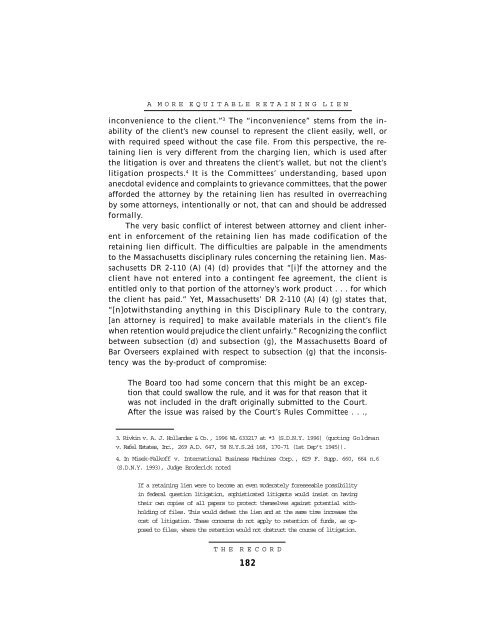THE RECORD - New York City Bar Association
THE RECORD - New York City Bar Association
THE RECORD - New York City Bar Association
You also want an ePaper? Increase the reach of your titles
YUMPU automatically turns print PDFs into web optimized ePapers that Google loves.
A M O R E E Q U I T A B L E R E T A I N I N G L I E N<br />
inconvenience to the client.” 3 The “inconvenience” stems from the inability<br />
of the client’s new counsel to represent the client easily, well, or<br />
with required speed without the case file. From this perspective, the retaining<br />
lien is very different from the charging lien, which is used after<br />
the litigation is over and threatens the client’s wallet, but not the client’s<br />
litigation prospects. 4 It is the Committees’ understanding, based upon<br />
anecdotal evidence and complaints to grievance committees, that the power<br />
afforded the attorney by the retaining lien has resulted in overreaching<br />
by some attorneys, intentionally or not, that can and should be addressed<br />
formally.<br />
The very basic conflict of interest between attorney and client inherent<br />
in enforcement of the retaining lien has made codification of the<br />
retaining lien difficult. The difficulties are palpable in the amendments<br />
to the Massachusetts disciplinary rules concerning the retaining lien. Massachusetts<br />
DR 2-110 (A) (4) (d) provides that “[i]f the attorney and the<br />
client have not entered into a contingent fee agreement, the client is<br />
entitled only to that portion of the attorney’s work product . . . for which<br />
the client has paid.” Yet, Massachusetts’ DR 2-110 (A) (4) (g) states that,<br />
“[n]otwithstanding anything in this Disciplinary Rule to the contrary,<br />
[an attorney is required] to make available materials in the client’s file<br />
when retention would prejudice the client unfairly.” Recognizing the conflict<br />
between subsection (d) and subsection (g), the Massachusetts Board of<br />
<strong>Bar</strong> Overseers explained with respect to subsection (g) that the inconsistency<br />
was the by-product of compromise:<br />
The Board too had some concern that this might be an exception<br />
that could swallow the rule, and it was for that reason that it<br />
was not included in the draft originally submitted to the Court.<br />
After the issue was raised by the Court’s Rules Committee . . .,<br />
3. Rivkin v. A. J. Hollander & Co., 1996 WL 633217 at *3 (S.D.N.Y. 1996) (quoting Goldman<br />
v. Rafel Estates, Inc., 269 A.D. 647, 58 N.Y.S.2d 168, 170-71 (1st Dep’t 1945)).<br />
4. In Misek-Falkoff v. International Business Machines Corp., 829 F. Supp. 660, 664 n.6<br />
(S.D.N.Y. 1993), Judge Broderick noted<br />
If a retaining lien were to become an even moderately foreseeable possibility<br />
in federal question litigation, sophisticated litigants would insist on having<br />
their own copies of all papers to protect themselves against potential withholding<br />
of files. This would defeat the lien and at the same time increase the<br />
cost of litigation. These concerns do not apply to retention of funds, as opposed<br />
to files, where the retention would not obstruct the course of litigation.<br />
T H E R E C O R D<br />
182

















